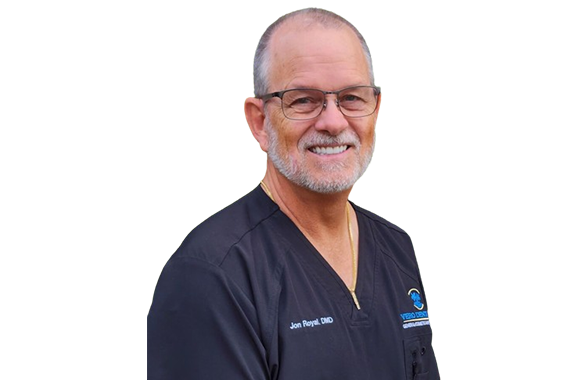What Is Myofascial Pain Disorder?
Myofascial Pain Disorder (MPD) is a chronic condition that affects the muscles and the fascia, the connective tissue surrounding them. It’s characterized by deep, aching pain that is typically localized to specific areas known as “trigger points.” These trigger points can cause pain in other parts of the body, leading to a condition known as “referred pain.” Unlike general muscle soreness, MPD is persistent and often requires medical intervention for proper management.
To schedule a consultation with our Vero Beach dentist, contact our dental office by calling (772) 778-5550.

Trigger Points
Trigger points are typically small, palpable knots or nodules within muscle tissue. When pressure is applied to these points, they can produce pain and often radiate pain to other areas of the body. There are two types of trigger points:
- Active Trigger Point: These are actively painful and can cause pain both locally and in a referred pattern.
- Latent Trigger Point: These are dormant trigger points that may not cause pain unless activated by pressure or muscle overuse.
Symptoms of Myofascial Pain Syndrome
MPD symptoms can vary from person to person, but common signs include:
- Deep, aching muscle pain: This pain is often described as a constant, dull ache.
- Muscle stiffness: Affected muscles may feel tight or stiff, reducing the range of motion.
- Tenderness in muscles: Pressing on trigger points can cause significant tenderness.
- Referred pain: Pain may occur in areas not directly connected to the trigger point.
- Sleep disturbances: Chronic pain can interfere with sleep patterns, leading to fatigue.
If you experience these symptoms, contact our dentist in Vero Beach to schedule a TMJ consultation.
Causes of Myofascial Pain Disorder
Myofascial pain syndrome can be caused by a variety of factors, including:
- Bruxism: Bruxism is the habitual grinding or clenching of teeth, which can stress the TMJ and surrounding muscles. Teeth grinding can cause muscle tension, and trigger points, which may lead to a myofascial pain syndrome.
- Jaw Trauma or Injury: Injury to the jaw or face can cause damage to the TMJ and surrounding muscles, leading to the disorder. Jaw trauma can be due to a sports injury, a car accident, or a physical impact.
- Arthritis: Arthritis is a condition that causes inflammation and damage to the joints. When arthritis affects the TMJ, it can cause pain, stiffness, and limited range of motion in the jaw.
- Poor Posture or Jaw Alignment: Poor posture or alignment of the jaw and neck can also contribute to the development of myofascial pain syndrome. This can include sitting at a desk for extended periods, holding the phone between the ear and shoulder, or sleeping in an awkward position.
Who Can Get Myofascial Pain Syndrome?
Anyone can develop myofascial pain syndrome, regardless of age, gender, or occupation. However, certain factors may increase the risk of developing the condition:
- History of jaw trauma or injury
- Regularly engaging in activities that put stress on the jaw and facial muscles
- Certain medical conditions such as fibromyalgia, chronic fatigue syndrome, or other chronic pain conditions
- Poor posture or jaw alignment
- Bruxism (the habit of grinding or clenching the teeth)
Myofascial Pain Syndrome Treatments
Treatment options for myofascial pain syndrome may vary depending on its severity and the underlying causes of the condition. Common treatments include:
- Physical Therapy: Stretching exercises and other physical therapy techniques can help improve the range of motion and alleviate pain in the jaw and surrounding muscles.
- Medications: Over-the-counter pain medications such as ibuprofen or acetaminophen may be recommended to alleviate pain and reduce inflammation. In some cases, we may prescribe medications such as muscle relaxants or antidepressants.
- Trigger Point Injections: These injections typically involve the injection of a local anesthetic or corticosteroid directly into the affected muscle.
- Dental Devices: In some cases, a splint or mouthguard can help alleviate symptoms of bruxism (teeth grinding) and reduce stress on the jaw and facial muscles.
- Surgery: In severe cases of myofascial pain, we may recommend surgery to alleviate pain and improve jaw function. However, surgery is typically only recommended after other treatment options have been exhausted.
Complications of Myofascial Pain Syndrome
If left untreated, MPD can lead to several complications, including:
- Chronic Pain: The pain may become persistent and more difficult to manage over time.
- Reduced Mobility: Muscle stiffness and pain can limit your ability to move freely.
- Sleep Disorders: Chronic pain can interfere with sleep, leading to insomnia or poor sleep quality.
- Emotional Distress: The ongoing pain and limitations can lead to anxiety, depression, and reduced quality of life.

Frequently Asked Questions
How is myofascial pain disorder in the TMJ diagnosed?
To diagnose MPD, a healthcare provider will typically perform a physical exam, assess the patient’s medical history and symptoms, and may order imaging tests such as X-rays, CT scans, or MRIs. In some cases, electromyography (EMG) or other specialized tests may also help diagnose the condition.
Can myofascial pain disorder in the TMJ be prevented?
While there’s no sure way to prevent myofascial pain disorder, several habits can help reduce the risk of developing the condition. Maintaining good posture, avoiding habits like teeth clenching or grinding, and using proper techniques when playing sports can help prevent the development of TMJ disorders. Additionally, regular exercise, a healthy diet, and maintaining a healthy weight can help reduce the risk of developing MPD.
Schedule Your Appointment Today!
If you’re experiencing symptoms of myofascial pain in the TMJ, it’s crucial to speak with a healthcare professional to receive an accurate diagnosis and appropriate treatment. Don’t let pain and discomfort interfere with your daily life.
For those in Vero Beach, schedule an appointment with our experienced dentists today. Call us at (772) 778-5550.

Get Your Complimentary
Consultation or 2nd Opinion
- Exam
- Full mouth X-ray
- Private Consultation with Doctor ($350 value)
- 3036 20th St,
Vero Beach, FL 32960 - (772) 778-5550
Working hours
- Monday: 8am - 5pm
- Tuesday: 8am - 5pm
- Wednesday: 8am - 5pm
- Thursday: 8am - 5pm
- Friday: 8am - 1pm
- Saturday & Sunday: Closed
